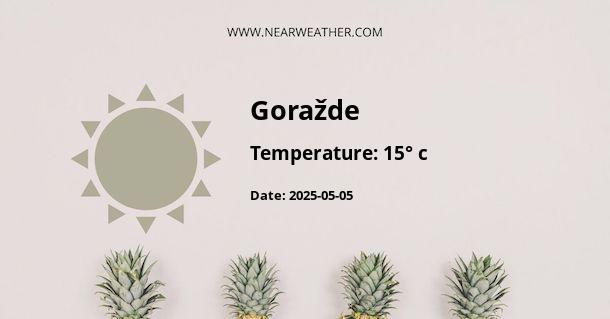Climate and Weather in Goražde, Bosnia and Herzegovina
Goražde, a quaint and industrious city positioned in the eastern part of Bosnia and Herzegovina, is distinguished by its continental climate, characterized by warm summers and generally cold winters. This city's climatic peculiarities are largely influenced by its geography, nestled among the scenic Dinaric Alps and along the Drina River. The geographical features contribute to a microclimate that can differ from the broader regional patterns. Embraced by nature, the city experiences climate nuances that are critical for residents, travelers, and climate enthusiasts alike to understand.
Overview of Goražde's Climate
According to the Köppen climate classification, Goražde's climate is classified as Cfb, which denotes a temperate oceanic climate with significant precipitation year-round. The classification reflects no significant dry season, a warm summer, and the coldest month averaging above 0 °C (32 °F).
Seasonal Weather Patterns
Winter
The winters in Goražde are generally cold, with January being the coldest month. Snowfall is common, and the city sees an average low temperature ranging from -3°C to -1°C. Freezing temperatures can lead to snow-covered landscapes that persist for several weeks, if not months.
Spring
Spring brings a gradual warming trend starting in March, with temperatures slowly rising from cool to mild. By May, the flora around Goražde is in full bloom, and the average high temperature can reach up to 19°C.
Summer
Summers are warm and the temperature often peaks in July and August, where average highs reach around 25°C to 27°C. During this season, the city is prone to intermittent heatwaves that can push daytime temperatures even higher.
Fall
Autumn sees a noticeable drop in temperature starting in September. The season is characterized by its picturesque foliage and crisp air. Cooler temperatures and more frequent precipitation eventually lead to the first frosts, signaling the onset of winter.
Annual Temperature and Precipitation
In Goražde, the average annual temperature ranges between a low of roughly 3°C to a high of 15°C. The city experiences an average annual precipitation of about 800 mm, indicative of its Cfb climate classification.
Table: Monthly Climate Averages
| Month | High / Low (°C) | Precipitation (mm) |
|---|---|---|
| January | 3 / -2 | 40 |
| February | 6 / -1 | 35 |
| March | 11 / 2 | 50 |
| April | 16 / 6 | 55 |
| May | 21 / 11 | 70 |
| June | 24 / 14 | 80 |
| July | 27 / 16 | 70 |
| August | 27 / 16 | 60 |
| September | 22 / 12 | 70 |
| October | 17 / 8 | 80 |
| November | 10 / 3 | 70 |
| December | 5 / -1 | 50 |
Weather-Related Considerations for Visitors and Residents
For visitors planning a trip to Goražde, timing is crucial. The summer months of July and August offer the most reliable weather for outdoor activities like hiking, while the winter provides picturesque snowy scenes and opportunities for winter sports in nearby regions. The non-peak seasons—Spring and Fall—can be ideal for those looking to avoid tourist crowds while still enjoying mild weather and the city's natural beauty.
For residents, understanding the local climate is important for several reasons. Proper insulation and heating systems are crucial for the cold winters, while methods of cooling are desirable during the hot summer peaks. The significant precipitation throughout the year also indicates the need for appropriate water management and flood prevention strategies, particularly as extreme weather events become more common with global climate change.
Long-Term Climate Trends and Projections
Recent studies have suggested that climate change may lead to more extreme weather conditions in the Balkans, including hotter and drier summers and colder, more severe winters. These shifts could have substantial implications for agriculture, energy consumption, and overall living conditions in Goražde.
Climate Adaptation and Sustainability Measures
In response to emerging climate challenges, local authorities in Goražde are considering various adaptation and sustainability measures. Initiatives may include enhancing green spaces to mitigate heat waves, improving the efficiency of buildings to reduce energy demand, and updating infrastructure to better cope with extreme weather.
Conclusion and Summary
Goražde's diverse climate and changing weather patterns present a unique living experience throughout the year. The knowledge of its temperate oceanic climate and the patterns of precipitation and temperature inform not just daily life decisions but also long-term strategic planning for both individuals and the local government. Embracing these climate challenges with sustainable solutions could ensure that Goražde remains resilient and thrives for generations to come.
A - Goražde's Latitude is 43.666939 & Longitude is 18.976391.
A - Weather in Goražde is 6° today.
A - Climate Conditions in Goražde shows overcast clouds today.
A - Humidity in Goražde is 85% today.
A - Wind speed in Goražde is 2.23 km/h, flowing at 225° wind direction. today.
